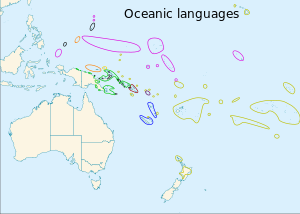| Malayo-Polynesian | |
|---|---|
| Geographic distribution | Southeast Asia, East Asia, the Pacific, Madagascar |
| Linguistic classification | Austronesian
|
| Proto-language | Proto-Malayo-Polynesian |
| Subdivisions | |
| Language codes | |
| ISO 639-5 | poz |
| Glottolog | mala1545 |
 The western sphere of Malayo-Polynesian languages. (The bottom three are Central-Eastern Malayo-Polynesian)
other Western Malayo-Polynesian languages (obsolete grouping)
the westernmost Oceanic languages | |
 The branches of the Oceanic languages:
Black ovals at the northwestern limit of Micronesia are the non-Oceanic languages Palauan and Chamorro. Black circles within green are offshore Papuan languages. | |
The Malayo-Polynesian languages are a subgroup of the Austronesian languages, with approximately 385.5 million speakers. The Malayo-Polynesian languages are spoken by the Austronesian peoples outside of Taiwan, in the island nations of Southeast Asia (Indonesia and the Philippine Archipelago) and the Pacific Ocean, with a smaller number in continental Asia in the areas near the Malay Peninsula, with Cambodia, Vietnam and the Chinese island Hainan as the northwest geographic outlier. Malagasy, spoken on the island of Madagascar off the eastern coast of Africa in the Indian Ocean, is the furthest western outlier.
Many languages of the Malayo-Polynesian family in insular Southeast Asia show the strong influence of Sanskrit, Tamil and Arabic, as the western part of the region has been a stronghold of Hinduism, Buddhism, and, later, Islam.
Two morphological characteristics of the Malayo-Polynesian languages are a system of affixation and reduplication (repetition of all or part of a word, such as wiki-wiki) to form new words. Like other Austronesian languages, they have small phonemic inventories; thus a text has few but frequent sounds. The majority also lack consonant clusters. Most also have only a small set of vowels, five being a common number.